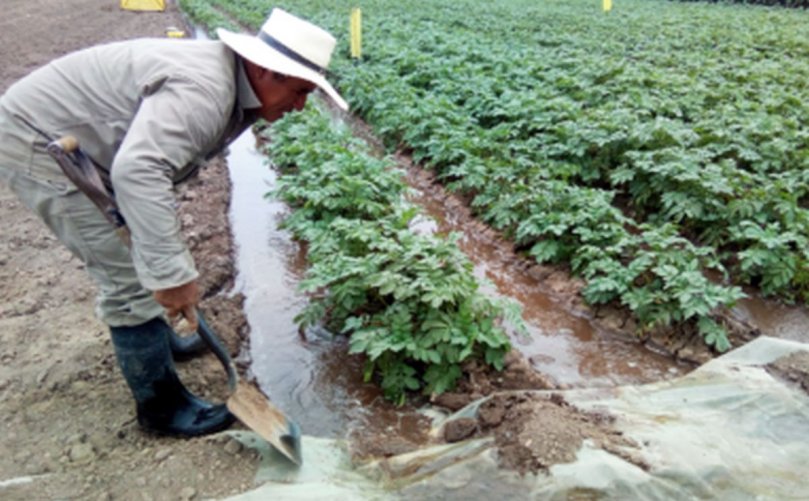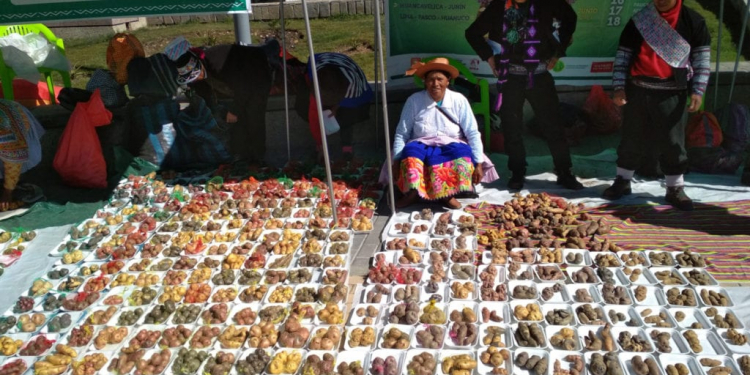The Andean Initiative Bayer and CIP is the meeting point of the efforts, a program that seeks to transform small-scale agriculture to promote the sustainable use of agrobiodiversity, effective climate action and healthier diets, through a regional innovation platform.
Climate change in the Andes is literally happening on the front lines. Not only is the incidence and intensity of its effects more pronounced compared to other regions, but it is also occurring in a geography that is home to the greatest variety of mountain biodiversity on the planet and where agriculture is carried out at the highest altitude anywhere. the world. The climatic extremes have outlined the ancestral knowledge of family, peasant and indigenous agriculture and its management practices in the Andean region.

Due to climate change there are at least 13 of the 107 wild relatives of the potato currently at risk. Furthermore, the altitudinal frontier of Andean agriculture has risen 300 meters uphill in the last 3 decades, trying to minimize crop losses due to higher temperatures, pests and diseases. The volume of carbon potentially released by this change in land use is equivalent to the volumes derived from deforestation in the Amazon. Despite this fact, carbon stocks in high Andean soils have received little attention from researchers, policy makers, and decision makers. This creates a fundamental opportunity for the conservation and sustainable use of agrobiodiversity.
Bayer supports the development of the CIP Andean Initiative , initially in Peru, Ecuador and Bolivia, which throughout 2020 has had a successful implementation, providing tools to protect agrobiodiversity, promote healthy diets and increase productivity and climate resilience ranging from hand. CIP focused on the interconnections between climate change and the sustainable use of agrobiodiversity in extreme and key geographies, offering a ‘basket of options’ for local adaptation and policy advocacy based on regional-scale models and forecasts.
Bayer and CIP explore other areas of collaboration through technology transfer and joint research in Integrated Pest Management (IPM) in potatoes and sweet potatoes, a strategy to sequester carbon from the soil and maintain their good health and finally the support to the initiatives of digital agriculture that is currently being developed by the CIP, through online courses where Good Agricultural Practices (GAP) are promoted.
Estefanía Laucata and Raquel Huamán, students of the Patacancha Agricultural Technical College in Cusco, Peru, are some of the beneficiaries of the technical education programs taught by the Andean Initiative and who emphasize that it respects and values their cultural identity, while enhancing their capabilities with digital tools.
“The Andean region is a living laboratory where small farmers, scientists, crop breeders and development professionals can study the impact of global warming and enable small farmers to be more resilient to the climate and its effects on agricultural productivity, nutrition , livelihoods and biodiversity, giving the world the opportunity to prepare for the temperature rise that is projected to occur in just 30 years, ”said Ginya Truitt Nakata, Regional Director for Latin America and the Caribbean of the International Potato Center ( CIP).
The alliance will focus on developing the general framework of the Andean Initiative, with the greatest potential for complementarity and multi-stakeholder impact through science for co-innovation. The purpose is to outline the objectives, milestones, key action sites, targets and partnerships by thematic area, as well as a methodology to increase climate resilience and measure the impact on small farmers.

The Andean Initiative is a regional innovation platform designed to preserve the unique agrobiodiversity of the Andes, promote healthy diets, and build a climate-resilient future. It was officially launched on July 22, 2020.
«At the end of 2019, Bayer, an innovative company in the agricultural sector, raised its sustainability standards and presented three ambitious global commitments: reduce 30% of the Carbon emissions associated with our operation in agriculture, reduce 30% of the impact of our portfolio in the water and on the ground; and finally, helping 100 million small farmers lift themselves out of poverty through product innovation, digital tools and personalized solutions. The alliance with the CIP in the Andean Initiative is a win-win ”, said Mathias Kremer, President of Bayer in the Andean Countries, Central America and the Caribbean.








